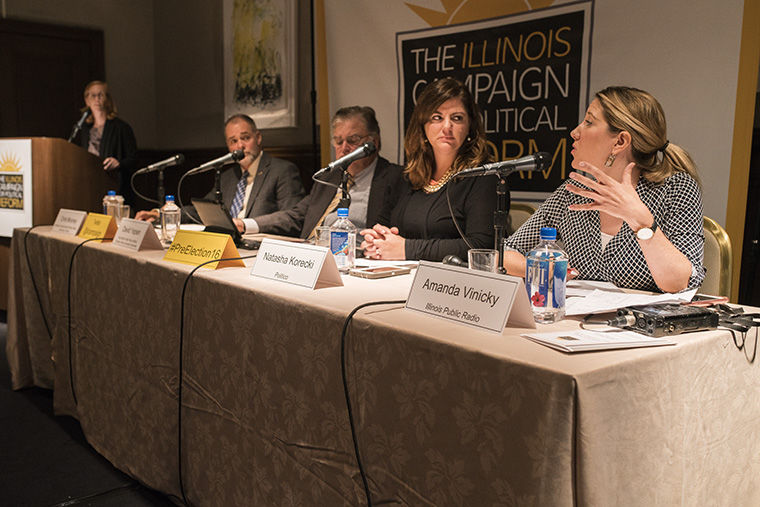Experts predict presidential race to affect Illinois elections
Political experts discussed the impact of the 2016 presidential candidates on state and local elections Oct. 17 at The Standard Club, 320 S. Plymouth Court.
October 24, 2016
Low voter turnout, reflecting lack of enthusiasm for the presidential candidates, could hurt candidates in local and state elections, said Chris Mooney, the director of the Institute of Government and Public Affairs at the University of Illinois at Urbana-Champaign.
Mooney and other political experts were panelists for “2016 Elections: What to Expect and Why,” held Oct. 17 at The Standard Club, 320 S. Plymouth Court.
“If people are discouraged about their choices at the top of the ticket, that could lead [lack of enthusiasm] and inactivity [at the polls],” Mooney said.
Another panelist, David Yepsen, director of the Paul Simon Public Policy Institute at Southern Illinois University-Carbondale, said Congress and Senate candidates have less time to get out their message if they have to explain and defend their positions on the presidential candidates.
“Trump’s candidacy takes a lot of the oxygen out of the room for down-ballot Republicans,” Yepsen said.
Hosted by the Illinois Campaign for Political Reform, a nonpartisan group that advocates public participation in elections, the panel also included Natasha Korecki, a senior reporter for POLITICO, and Amanda Vinicky, the Statehouse Bureau Chief for National Public Radio Illinois.
Discussing how the presidential race was likely to affect the Senate campaigns of Tammy Duckworth and Mark Kirk, Yepsen said Kirk has distanced himself from the Republican base.
“[Kirk] already had problems with conservatives who thought he was too moderate,” Yepsen said.
Sarah Brune, executive director of the ICPR, told The Chronicle that the election will be a test to see whether dissatisfaction with the presidential candidates will affect smaller elections.
According to Real Clear Politics, which analyzes national political polls, Democratic Candidate Hillary Clinton has a 52.3 percent unfavorable rating, while her opponent, Republican Donald Trump, has a 60.9 percent unfavorable rating. Yepsen said those national numbers also reflect Illinois sentiment.
Sharon Alter, who attended the event, is a co-chairwoman for the League of Women Voters of Illinois, a nonpartisan organization that educates voters. She said most people will vote for their party’s candidates, but they may not vote that way if they do not support the presidential candidate.
“By leaving [the presidential ballot] blank, they are deferring to the voters who choose a particular candidate, [who] may not be the one they really want,” Alter said.
In response to an audience question, Mooney suggested young voters find an issue that resonates with them, like financing college education. “The more a person sees [how] the political system affects them personally, the more likely they are to vote,” he said.
Millennials should be asking questions like “Why aren’t we able to refinance our loans?” he said.
Brune agreed with Mooney’s advice and said education about the importance of voter participation toward young voters needs to be more effective.
“If we can find a better way to message, we could increase the involvement from [millennials],” Brune said.








